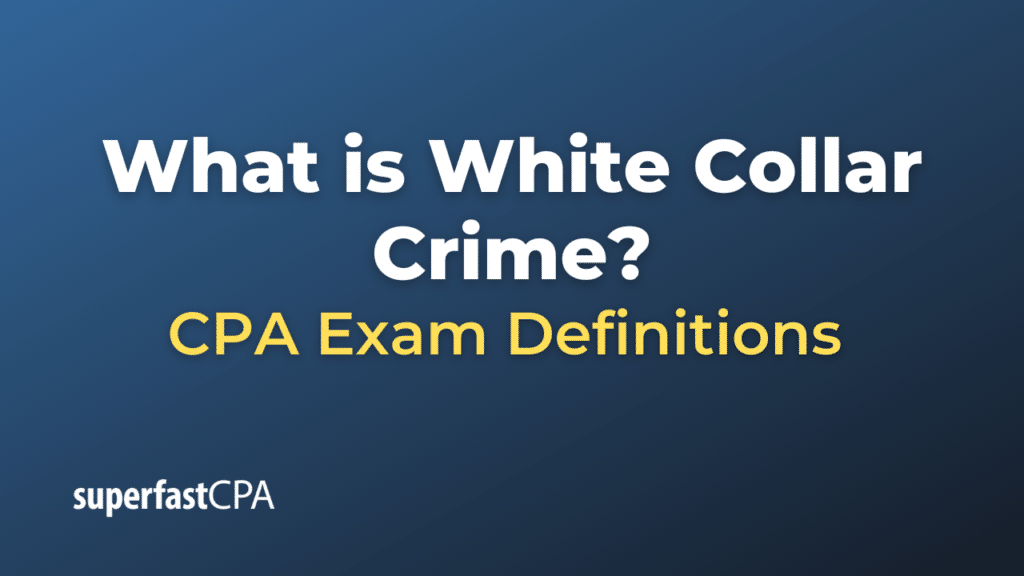White Collar Crime
White-collar crime refers to non-violent criminal offenses that are typically committed by individuals or organizations in business or professional settings. Unlike “blue-collar” crimes, which are often violent and physical in nature (such as robbery or assault), white-collar crimes are usually characterized by deceit, manipulation, or breach of trust. These crimes are often financially motivated and involve the illegal or unethical manipulation of financial records, securities markets, or assets.
Types of White-Collar Crimes
Here are some common types of white-collar crimes:
- Fraud: This is a broad category that includes securities fraud, insurance fraud, real estate fraud, and more. Fraud involves deceiving another individual or entity for financial gain.
- Embezzlement: This involves the unlawful taking of money or property by someone who was trusted with its care, typically in a corporate or employment setting.
- Money Laundering: The process of making illegally obtained money appear legitimate through a complex sequence of transactions.
- Tax Evasion: Illegally avoiding paying taxes, often by falsifying records or underreporting income.
- Insider Trading: The illegal practice of trading stocks or other securities based on confidential, “inside” information about the company.
- Identity Theft: The stealing of personal information for financial gain.
- Forgery: The act of creating, using, or altering documents with the intent to deceive.
- Bribery: Offering, receiving, or soliciting something of value as a means to influence the actions of an individual or organization in a position of power.
- Cybercrime: This involves criminal activities carried out through computers or the internet, such as hacking into secure networks or online fraud.
- Intellectual Property Theft: This includes stealing or pirating patented, copyrighted, or trademarked material.
- Price Fixing: An agreement among firms to charge the same price for a product or service, thereby undermining the free-market system.
- Antitrust Violations: Actions that discourage or prohibit competition within a market.
Legal Consequences
The penalties for white-collar crimes can vary but often include hefty fines, restitution to victims, and imprisonment. In the United States, agencies like the Securities and Exchange Commission (SEC), the Federal Bureau of Investigation (FBI), and the Internal Revenue Service (IRS) are often involved in the investigation and prosecution of such crimes. Many other countries have similar regulatory bodies.
Ethical and Social Implications
While white-collar crimes may appear less harmful because they don’t involve physical violence, their impact can be widespread, affecting countless individuals and entire communities. They can lead to the loss of jobs, collapse of companies, and can undermine faith in key institutions.
Given the complexities involved in white-collar crime, it’s advisable for those accused to seek legal counsel experienced in this area of law. Likewise, potential victims or whistleblowers should consult legal and financial advisors when they suspect white-collar criminal activity.
Example of White Collar Crime
Here’s a fictional example to illustrate the concept of white-collar crime:
Scenario
John Doe is the Chief Financial Officer (CFO) of a publicly-traded technology company, “TechGenius Corp.” Under pressure to meet investor expectations for quarterly earnings, John decides to manipulate the company’s financial statements. He inflates revenue figures and understates expenses, creating the illusion that the company is more profitable than it actually is. His actions prop up the stock price and mislead investors into thinking the company is in strong financial health.
Actions Constituting White-Collar Crime
- Securities Fraud: By manipulating the financial statements, John is committing securities fraud. Investors are buying shares based on false information, which is a violation of securities laws.
- Embezzlement: To further cover his tracks, John diverts some company funds to an offshore account. He plans to return the money after manipulating future profits but is technically embezzling company funds in the meantime.
- Insider Trading: Knowing that the stock price will tumble when the truth comes out, John tips off a close friend to sell their substantial shareholdings in TechGenius Corp. This constitutes insider trading.
Detection and Consequences
An internal audit raises some red flags, and the U.S. Securities and Exchange Commission (SEC) starts an investigation. Forensic accountants discover the manipulated records, and the FBI gets involved to investigate further.
John is arrested and charged with multiple counts of securities fraud, embezzlement, and insider trading. If convicted, he faces a long prison sentence, significant fines, and will likely be barred from serving as an officer or director of a publicly-traded company ever again.
Impact on Stakeholders
- Investors: Those who bought shares based on false information suffer substantial financial losses.
- Employees: The scandal shakes employee morale, and layoffs ensue as the company faces financial hardship.
- Market: The integrity of the market is undermined, as trust in financial reporting is a cornerstone of a functioning capital market.
This example illustrates how white-collar crimes can have far-reaching implications, affecting not just one individual but an entire ecosystem of stakeholders, including investors, employees, and the market at large.













